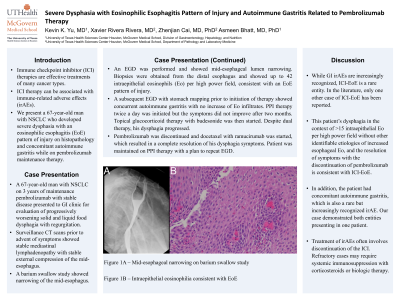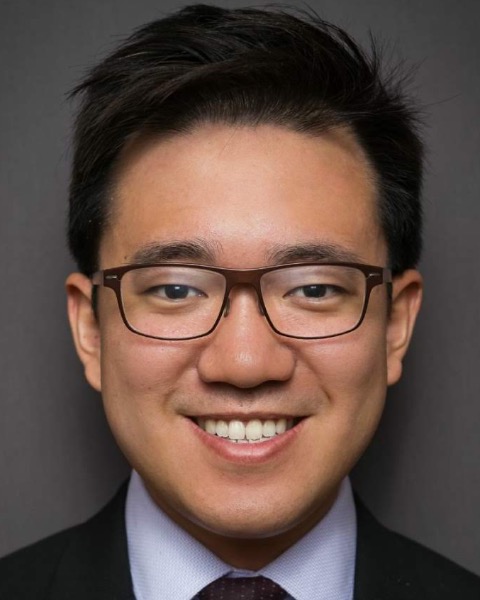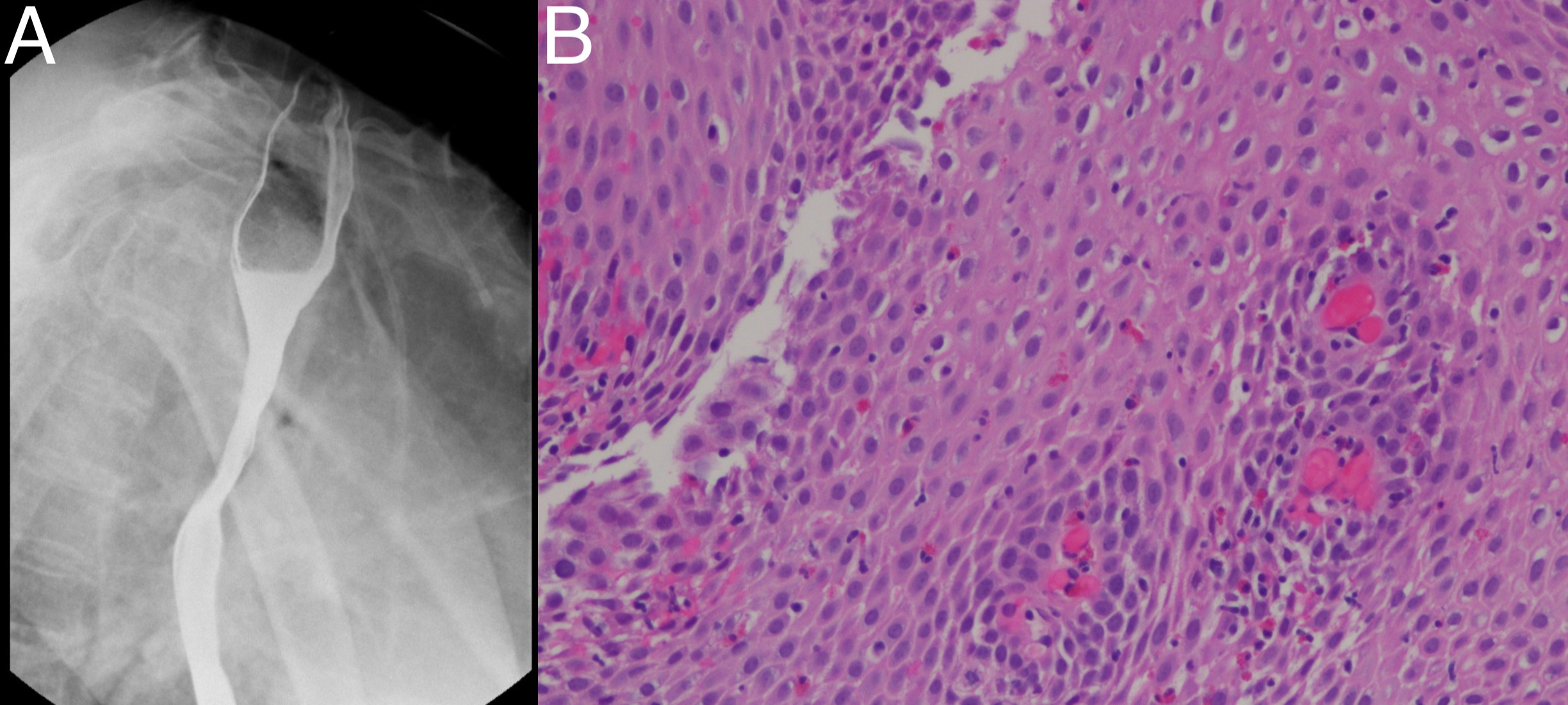Back


Poster Session C - Monday Afternoon
Category: Esophagus
C0229 - Severe Dysphasia With Eosinophilic Esophagitis Pattern of Injury and Autoimmune Gastritis Related to Pembrolizumab Therapy
Monday, October 24, 2022
3:00 PM – 5:00 PM ET
Location: Crown Ballroom

Has Audio

Kevin K. Yu, MD
UT HSC - Houston
Houston, TX
Presenting Author(s)
Kevin K. Yu, MD1, Xavier Rivera Rivera, MD2, Zhenjian Cai, MD3, Asmeen Bhatt, MD, PhD2
1UT HSC - Houston, Houston, TX; 2UT Health Sciences Center at Houston, Houston, TX; 3UTH HS - Houston, Houston, TX
Introduction: Immune checkpoint inhibitor (ICI) therapies are effective treatments of many cancer types, including non-small cell lung carcinoma of the lung (NSCLC). While efficacious, ICI therapy can be associated with immune-related adverse effects (irAEs). We present a 67-year-old man with NSCLC who developed severe dysphasia with an eosinophilic esophagitis (EoE) pattern of injury on histopathology and concomitant autoimmune gastritis while on pembrolizumab maintenance therapy.
Case Description/Methods: A 67-year-old man with NSCLC on 3 years of maintenance pembrolizumab with stable disease presented to GI clinic for evaluation of progressively worsening solid and liquid food dysphagia with regurgitation. Surveillance CT scans prior to advent of symptoms showed stable mediastinal lymphadenopathy with stable external compression of the mid-esophagus. A barium swallow study showed narrowing of the mid-esophagus. An EGD was performed and showed mid-esophageal lumen narrowing. Biopsies were obtained from the distal esophagus and showed up to 42 intraepithelial eosinophils (Eo) per high power field, consistent with an EoE pattern of injury. A subsequent EGD with stomach mapping prior to initiation of therapy showed concurrent autoimmune gastritis with no increase of Eo infiltrates. PPI therapy twice a day was initiated but the symptoms did not improve after two months. Topical glucocorticoid therapy with budesonide was then started. Despite dual therapy, his dysphagia progressed. Pembrolizumab was discontinued and docetaxel with ramucirumab was started, which resulted in a complete resolution of his dysphagia symptoms. Patient was maintained on PPI therapy with a plan to repeat EGD.
Discussion: While GI irAEs are increasingly recognized, ICI-EoE is a rare entity. In the literature, only one other case of ICI-EoE has been reported. This patient’s dysphagia in the context of >15 intraepithelial Eo per high power field without other identifiable etiologies of increased esophageal Eo, and the resolution of symptoms with the discontinuation of pembrolizumab is consistent with ICI-EoE. In addition, the patient had concomitant autoimmune gastritis, which is also a rare but increasingly recognized irAE. Our case demonstrated both entities presenting in one patient. Treatment of irAEs often involves discontinuation of the ICI. Refractory cases may require systemic immunosuppression with corticosteroids or biologic therapy.

Disclosures:
Kevin K. Yu, MD1, Xavier Rivera Rivera, MD2, Zhenjian Cai, MD3, Asmeen Bhatt, MD, PhD2. C0229 - Severe Dysphasia With Eosinophilic Esophagitis Pattern of Injury and Autoimmune Gastritis Related to Pembrolizumab Therapy, ACG 2022 Annual Scientific Meeting Abstracts. Charlotte, NC: American College of Gastroenterology.
1UT HSC - Houston, Houston, TX; 2UT Health Sciences Center at Houston, Houston, TX; 3UTH HS - Houston, Houston, TX
Introduction: Immune checkpoint inhibitor (ICI) therapies are effective treatments of many cancer types, including non-small cell lung carcinoma of the lung (NSCLC). While efficacious, ICI therapy can be associated with immune-related adverse effects (irAEs). We present a 67-year-old man with NSCLC who developed severe dysphasia with an eosinophilic esophagitis (EoE) pattern of injury on histopathology and concomitant autoimmune gastritis while on pembrolizumab maintenance therapy.
Case Description/Methods: A 67-year-old man with NSCLC on 3 years of maintenance pembrolizumab with stable disease presented to GI clinic for evaluation of progressively worsening solid and liquid food dysphagia with regurgitation. Surveillance CT scans prior to advent of symptoms showed stable mediastinal lymphadenopathy with stable external compression of the mid-esophagus. A barium swallow study showed narrowing of the mid-esophagus. An EGD was performed and showed mid-esophageal lumen narrowing. Biopsies were obtained from the distal esophagus and showed up to 42 intraepithelial eosinophils (Eo) per high power field, consistent with an EoE pattern of injury. A subsequent EGD with stomach mapping prior to initiation of therapy showed concurrent autoimmune gastritis with no increase of Eo infiltrates. PPI therapy twice a day was initiated but the symptoms did not improve after two months. Topical glucocorticoid therapy with budesonide was then started. Despite dual therapy, his dysphagia progressed. Pembrolizumab was discontinued and docetaxel with ramucirumab was started, which resulted in a complete resolution of his dysphagia symptoms. Patient was maintained on PPI therapy with a plan to repeat EGD.
Discussion: While GI irAEs are increasingly recognized, ICI-EoE is a rare entity. In the literature, only one other case of ICI-EoE has been reported. This patient’s dysphagia in the context of >15 intraepithelial Eo per high power field without other identifiable etiologies of increased esophageal Eo, and the resolution of symptoms with the discontinuation of pembrolizumab is consistent with ICI-EoE. In addition, the patient had concomitant autoimmune gastritis, which is also a rare but increasingly recognized irAE. Our case demonstrated both entities presenting in one patient. Treatment of irAEs often involves discontinuation of the ICI. Refractory cases may require systemic immunosuppression with corticosteroids or biologic therapy.

Figure: Figure 1A – Mid-esophageal narrowing on barium swallow study
Figure 1B – Intraepithelial eosinophilia consistent with EoE
Figure 1B – Intraepithelial eosinophilia consistent with EoE
Disclosures:
Kevin Yu indicated no relevant financial relationships.
Xavier Rivera Rivera indicated no relevant financial relationships.
Zhenjian Cai indicated no relevant financial relationships.
Asmeen Bhatt indicated no relevant financial relationships.
Kevin K. Yu, MD1, Xavier Rivera Rivera, MD2, Zhenjian Cai, MD3, Asmeen Bhatt, MD, PhD2. C0229 - Severe Dysphasia With Eosinophilic Esophagitis Pattern of Injury and Autoimmune Gastritis Related to Pembrolizumab Therapy, ACG 2022 Annual Scientific Meeting Abstracts. Charlotte, NC: American College of Gastroenterology.
